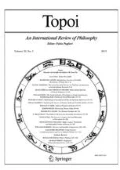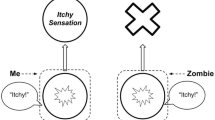Abstract
Dissociation thought experiments like Zombie and Inverted Spectrum cases play an essential role in the qualia debate. Critics have long since argued that these cases raise serious epistemic issues, undermining first person access to phenomenal states also in normal subjects. Proponents have denied this because, due to their phenomenal experience, normal subjects have epistemic abilities that Zombies don’t have. Here I will present a modified version of these thought experiments: Part-time Zombies and Part-time Inverts switch between normal and abnormal states every now and then. Thus they provide insight into their epistemic situation showing that the mere possibility of Zombies and Inverts has consequences which undermine essential epistemic features of phenomenal properties even in normals. This line of reasoning will be corroborated by theoretical considerations on the epistemic requirements of phenomenal states. All this provides support for the “functional mapping hypothesis.” According to this hypothesis, any significant phenomenal difference can be mapped to a specific functional difference which is accessible from the third person perspective as well.
Similar content being viewed by others
Notes
This expression is a tag for a number of different positions holding that mental, particularly phenomenal states, cannot be explained in (neuro)-scientific terms. Among them are Levine’s (1983, 1993) explanatory gap argument, Chalmers’s (1995, 1996) hard problem, but also similar views held, among others, by Kim (1992), Nagel (1974) and Jackson (1982). There are obvious differences between these positions, particularly as far as metaphysical consequences are concerned. Still I think that the idea of an epistemic gap is held by all of them. Although my discussion will focus on the positions of Chalmers and Levine, most of it also holds for the other authors as well.
In what follows I will talk about the absence of functional differences only. The underlying assumption is that physical differences imply functional differences such that a functional duplicate is also a physical duplicate.
Typical cases of significant differences are those between primary colors like red or green or between basic emotions like anger or happiness or between the presence and the absence of a moderately strong experience of pain under ceteris paribus conditions. See also the “minimal recognition requirement” below.
The specificity requirement excludes the possibility of two phenomenal differences being mapped to one functional difference, such that the difference between red and green and the one between blue and yellow could be mapped to the same functional difference.
Here, only thought experiments and arguments are presented that focus on the epistemic implications of the problem. I will not discuss thought experiments and papers focusing on the metaphysical implications of Zombies and the epistemic gap.
This assumption is accepted by almost all the participants in the debate. The basic idea is that acquiring a new belief implies that your disposition to react on related issues changes, even if this change might not become apparent directly, say in your behavior. But we would deny that you have learned that the earth is a ball rather than a disk if you would keep saying or thinking the opposite when asked about these matters, provided there are not good reason for you to deny your newly acquainted knowledge. This point will be discussed in a bit more detail below, particularly in the comments on third premise of the argument regarding the functional mapping hypothesis below and in footnote 19.
This assumes that congenitally blind persons can’t even imagine a green experience. I don’t think this needs to be true but I accept if for the sake of argument.
Although the basic idea of Part-time Zombies is somewhat similar to Fading qualia thought experiments they avoid certain substantial problems that Fading qualia have. One of the basic ideas of dissociation thought experiments is that they show a phenomenal difference in the absence of any functional and physical difference. Fading qualia thought experiments, however, include physical differences due to the exchange of neural tissue by silicon chips. Moreover, the lack of phenomenal experience in the fading qualia state is explained by this physical difference. As a consequence they beg the question against the qualophile who denies exactly this. Finally, it is difficult for these approaches to deal with objections from dualists who deny in the first place that mental states are physically realized. Part-time Zombies and Inverts by contrast have no such commitments and allow for a complete pheno-functional dissociation.
There is a small caveat: This is, of course, true only if the Part-time Zombie has enjoyed the related experience before. The Part-time Zombie would neither have phenomenal beliefs regarding greenness nor the related phenomenal concept if they had always been in the absent qualia mode while perceiving or imagining green objects.
What if the Part-time Zombie tries to make the distinction when they are in the absent qualia mode? First, they will come to the same result, namely that there is no difference between t1 and t2. But what if the qualophile argues that there are no real phenomenal beliefs in the absent qualia mode? This would be a more demanding understanding of phenomenal beliefs compared to the one that qualophiles have brought forward so far. But even if this could be defended, it would make no difference because the Zombie would apply the same—insufficient—concept to t1 and t2, so again, there would be no difference.
You can, of course, refer to laws of nature, but these are based on empirical evidence also.
Again, you need to have had the relevant phenomenal experiences at least once in order to have the right phenomenal beliefs and concepts.
I take it that this holds for insignificant differences as well. So if we want to explain why the color expert is able to tell the difference between an experience of “Luminous red (RAL 3024)”, “Pure red” (RAL 3028), and “Luminous bright red” (RAL 3025), then we have to assume that these experiences are functionally different. However, unlike the cases before regarding significant differences, this ability is not entailed by the concept of a phenomenal experience; it’s just an additional premise of the present consideration.
Note that it is not inconsistent to require that the functional mapping has to hold in all conceptually possible worlds while recognition is supposed to occur only in some of these worlds. The reason is that the former is a necessary condition for the latter, such that, if we want to guarantee weak reliability then we have to suppose functional mapping across all conceptually possible worlds.
Provided that there are no other ways of detecting the difference—which exist in most cases.
What if neuroscientists find out that we can’t recognize the differences mentioned above (red/green, pain/pleasure) with the minimal amount of reliability? It take this to be extremely unlikely. That’s why it’s difficult to speculate what would happen in this case. I guess that we might have to lower our conceptual standards for phenomenal experiences as it has been proposed by Dennett. This, however, would not help the epistemic gap project for the reasons already mentioned: Why should we try to explain the difference between red and green experiences if there is no way for us to recognize it with a minimal amount of reliability?
Note that I am not committed to specific sorts of inputs and outputs. So even if functionalists in the philosophy of mind tend to assume that inputs are perceptual stimuli while outputs are behavioral dispositions, this does not need to be the case on the more generic definition of function that is endorsed here: Inputs may also come from other cognitive processes, outputs may be dispositions to bring about even other cognitive, bodily, or behavioral dispositions. Given that all these outputs can be detected from the third person perspective with scientific methods, at least in principle, that’s all what is needed in the present argument.
Although epistemic differences imply cognitive differences, the reverse does not need to be true: There may be cognitive differences that do not imply an epistemic difference. Still I think like almost all qualophiles that cognitive differences imply functional differences. There are two reasons: First, given that cognition is generally understood as some kind of information processing (see Binder et al. 2009, 779), a cognitive difference should be cashed out as a difference in information processing which, in turn, would imply a functional difference, say, with respect to subsequent behavior or cognitive states. We would simply deny that any information processing has taken place if there were no difference on the functional level. Note that this does not imply actual behavioral or cognitive differences but only the related disposition to bring about those differences. Second, even if there is certainly a cognitive phenomenology (Bayne and Montague 2011), it is difficult to see what a non-functional cognitive difference should be, if it is not purely phenomenal.
For more details see (Pauen 2010).
See (Robinson 1982).
References
Bayne T, Montague M (2011) Cognitive phenomenology. Oxford University Press, Oxford
Binder MD, Hirokawa N, Windhorst U (2009) Encyclopedia of neuroscience, vol 5. Springer, Berlin
Chalmers DJ (1995) Absent qualia, fading qualia, dancing qualia. In: Metzinger T (ed) Conscious experience. Schöningh Imprint Academics, Paderborn
Chalmers DJ (1996) The conscious mind: in search of a fundamental theory. Oxford University Press, Oxford
Chalmers DJ (2003) The content and epistemology of phenomenal beliefs. In: Smith Q, Jokic A (eds) Consciousness: new philosophical perspectives. Oxford University Press, Oxford
Dennett DC (1993) Quining qualia. In: Goldman AI (ed) Readings in philosophy and cognitive science. MIT Press, Cambridge, MA, pp 381–414
Dennett DC (1995) The unimagined preposterousness of zombies. J Conscious Stud 2(4):322–326
Dennett DC (2005) Sweet dreams: philosophical obstacles to a science of consciousness. MIT Press, Cambridge, MA
Jackson F (1982) Epiphenomenal qualia. Philos Q 32:127–136
Kim J (1992) ‘Downward causation’ in emergentism and nonreductive physicalism. In: Beckermann A, Flohr H, Kim J (eds) Emergence or reduction: essays on the prospects of nonreductive physicalism. De Gruyter, Berlin
Levine J (1983) Materialism and qualia: the explanatory gap. Pac Philos Q 64:354–361
Levine J (1993) On leaving out what it’s like. In: Davies M, Humphreys GW (eds) Consciousness. psychological and philosophical essays. Blackwell, Oxford
Levine J (2001) Purple haze: the puzzle of consciousness. Oxford University Press, Oxford
Loar B (1997) Phenomenal states. In: Block N, Flanagan O, Güzeldere G (eds) The nature of consciousness: philosophical debates. MIT Press, Cambridge, MA, pp 597–616
Nagel T (1974) What is it like to be a bat? Philos Rev 83:435–450
Pauen M (2006) Feeling causes. J Conscious Stud 13(1-2):129–152
Pauen M (2010) How privileged is first person privileged access. Am Philos Q 47(1):1–16
Robinson WS (1982) Causation, sensations and knowledge. Mind XCI:524–540
Searle JR (1992) The rediscovery of the mind. MIT Press, Cambridge, MA
Shoemaker S (1975) Functionalism and qualia. Philos Stud 27:271–315
Stalnaker R (1998) What might nonconceptual content be? Philos Issues 9:339–352
Tye M (2006) Absent qualia and the mind–body problem. Philos Rev 115:139–168
Acknowledgments
I would like to thank Yael Brahms, Owen Flanagan, Daniel Friedrich, Ellen Fridland, Romy Jaster, Yakir Levin, Joe Levine, Ira Schnall, Oron Shagrir, and David Widerker for important comments and suggestions.
Author information
Authors and Affiliations
Corresponding author
Rights and permissions
About this article
Cite this article
Pauen, M. The Functional Mapping Hypothesis. Topoi 36, 107–118 (2017). https://doi.org/10.1007/s11245-015-9302-y
Published:
Issue Date:
DOI: https://doi.org/10.1007/s11245-015-9302-y



